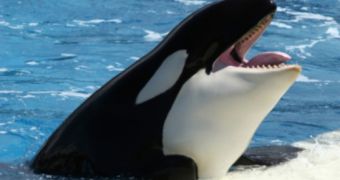A few days ago, marine park SeaWorld decided to fight back all the bad publicity it had been receiving following the release of documentary film “Blackfish,” and published an open letter explaining that its employees were all “animal advocates” that would never harm whales, dolphins and the like.
Together with PETA, green group Sea Shepherd does not think the open letter is an accurate representation of the marine park's working agenda. Hence, the organization saw fit to share its thoughts on SeaWorld and its claims that it is not guilty of abusing animals.
In a blogpost, Sea Shepherd says that, although it is true that SeaWorld currently owns just two killer whales that have been captured in the wild in its care, the marine park has conveniently forgotten to make any reference to “the violent and traumatic captures that these orcas endured.”
Besides, the group says that most of the whales born at SeaWorld are the result of inbreeding, which means that they display genetic abnormalities and mutations. Hence, the marine park's breeding program is anything but successful.
Sea Shepherd further details that, as shown in documentary film “Blackfish,” SeaWorld is no stranger to the practice of separating young whales from their mothers and shipping them to other facilities.
“As you can see in ‘Blackfish,’ SeaWorld has in fact removed calves from their mother’s side and transported them to their other parks,” the Sea Shepherd organization writes on its website.
Furthermore, “Even if this is old footage, it is quite possible that SeaWorld continues this practice. They continue to breed marine mammals, including orcas. Some are transferred between facilities to breed or to perform.”
The green group also says that, contrary to SeaWorld's claims in its open letter, marine mammals living at this marine park do not receive proper nourishment.
On the contrary, they are given thawed dead fish that are often “spiced” with antibiotics and vitamins intended to make it easier for the whales to survive in captivity. Besides, orcas are fed loads of gelatin that is supposed to help them stay hydrated.
Because of these living conditions, many of the whales at SeaWorld have much shorter lives than specimens swimming freely in the wild.
What's more, they cannot possibly help researchers gain a better understanding of whales living in the wild, as SeaWorld claims, simply because captivity forces them to behave in unnatural ways.
Sea Shepherd also says that, although it is true that SeaWorld releases some animals in the wild, these animals are more often than not manatees, sea turtles and other aquatic creatures that cannot be taught to perform tricks and used to attract crowds to the marine park's shows.
“The bottom line is that SeaWorld is part of the massive machine that is the captive marine mammal industry, an industry willing to spew whatever lies it can in order to keep you spending your money at their parks,” Sea Shepherd says.
“This industry is inextricably linked not only to the deaths of the animals in their tanks, but to the deaths of marine mammals brutally slaughtered in Taiji, Japan where dolphin trainers work side-by-side with dolphin killers to hand-pick those who are suitable for captivity – those who are ‘prettiest’ and without visible scars,” it adds.

 14 DAY TRIAL //
14 DAY TRIAL //